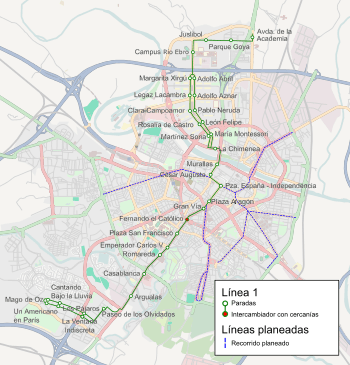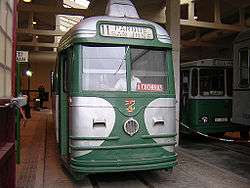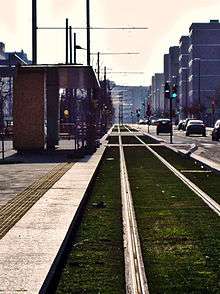Zaragoza tram
The Zaragoza Tram (Spanish: Tranvía de Zaragoza) is a tram system in the Spanish city of Zaragoza, capital of the autonomous community of Aragon. Line 1 will be expanded with a second and third line.

| Overview | |
|---|---|
| Native name | Tranvía de Zaragoza |
| Locale | Zaragoza, Aragón, Spain |
| Transit type | Light rail |
| Number of lines | 1 |
| Number of stations | 25 |
| Annual ridership | 27.8 million (2018)[1] |
| Technical | |
| System length | 12.8 km (8.0 mi) |
| Track gauge | 1,435 mm (4 ft 8 1⁄2 in) standard gauge |
History

In 1885, the first animal traction tram line was established.
In 1902, Zaragoza had five main lines and one secondary line. In the same year, one of the lines were electrified. The network was expanding quickly in a radial form across the city, with the present Spain square as the center.
The 1950s was the heydey of the Zaragoza Tram.
From the 1960s, the tram system declined, with little or no investment and was gradually converted to bus operation
On 23 January 1976 the last Zaragoza tram line (Parque-San José) disappeared and the company changed its name to Transportes Urbanos de Zaragoza (Urban Transport Company of Zaragoza).
10 June 2009 The Traza consortium of Tuzsa, CAF, FCC Construcción, Acciona, Ibercaja and Concessia selected to build new tramway.[2]
19 April 2011 Phase 1 of Line 1 opened.[3] Phase 2 of the work of the new tram line 1 began for completion in mid-2013.[3]
Two more lines are proposed:
- Line 2 (Las Fuentes-Delicias (Zaragoza))
- Line 3 (La Jota-Torrero)
Network
Line 1 (Valdespartera-Parque Goya)

| Line 1 | |||||||||||||||||||||||||||||||||||||||||||||||||||||||||||||||||||||||||||||||||||||||||||||||||||||||||||||||||||||||||||||||||||||||||||||||||||||||||||||||||||||||||||||||||||||||||||||||||||||||||||||||||||||||||||||||||||||||||||||||||||||||||||||||||||||||||||||||||||||||||||||||||||||||||||||||||||||||||||||||||
|---|---|---|---|---|---|---|---|---|---|---|---|---|---|---|---|---|---|---|---|---|---|---|---|---|---|---|---|---|---|---|---|---|---|---|---|---|---|---|---|---|---|---|---|---|---|---|---|---|---|---|---|---|---|---|---|---|---|---|---|---|---|---|---|---|---|---|---|---|---|---|---|---|---|---|---|---|---|---|---|---|---|---|---|---|---|---|---|---|---|---|---|---|---|---|---|---|---|---|---|---|---|---|---|---|---|---|---|---|---|---|---|---|---|---|---|---|---|---|---|---|---|---|---|---|---|---|---|---|---|---|---|---|---|---|---|---|---|---|---|---|---|---|---|---|---|---|---|---|---|---|---|---|---|---|---|---|---|---|---|---|---|---|---|---|---|---|---|---|---|---|---|---|---|---|---|---|---|---|---|---|---|---|---|---|---|---|---|---|---|---|---|---|---|---|---|---|---|---|---|---|---|---|---|---|---|---|---|---|---|---|---|---|---|---|---|---|---|---|---|---|---|---|---|---|---|---|---|---|---|---|---|---|---|---|---|---|---|---|---|---|---|---|---|---|---|---|---|---|---|---|---|---|---|---|---|---|---|---|---|---|---|---|---|---|---|---|---|---|---|---|---|---|---|---|---|---|---|---|---|---|---|---|---|---|---|---|---|---|---|---|---|---|---|---|---|---|---|---|---|---|---|---|---|---|---|---|---|---|---|---|---|---|---|---|---|---|---|---|---|---|---|
| |||||||||||||||||||||||||||||||||||||||||||||||||||||||||||||||||||||||||||||||||||||||||||||||||||||||||||||||||||||||||||||||||||||||||||||||||||||||||||||||||||||||||||||||||||||||||||||||||||||||||||||||||||||||||||||||||||||||||||||||||||||||||||||||||||||||||||||||||||||||||||||||||||||||||||||||||||||||||||||||||
The initial north-south line has 25 stops with side platforms except in two of them. The average distance between consecutive stops is about 500 m, adding a total length of 12.8 km line, operating at an average commercial speed of 19 km/h, with an end-to-end journey time of 40 minutes, 19 minutes for the journey Academia General Militar-Plaza de España (Spain Square) and 21 minutes from Plaza de España to Plaza Cinema Paradiso (Valdespartera).
Construction work started on August 18, 2009 and was projected to last four years in two phases:
- Phase 1 (2009–2011): Section between the Valdespartera neighbourhood and Plaza de Basilio Paraiso. Opened 19 April 2011.[3]
- Phase 2: (2011–2013): Section between the Plaza de Basilio Paraiso and Academia General Militar. Currently is under construction.[3]
The estimated investment is 400 million euros:
- Construction of the track and electrical system 202 million
- Purchase of rolling stock: 82 million
- Construction of the depot: 37 million
- Private investment due to works' enhancing "private" facilities: 55 million
- Traffic light system integration and other expenses: 25 million
The expected traffic in the project is around 100,000 passengers per day, with an average rate of 0.75 euros per passenger. In 2018, the line served 27.8 million passengers.
Rolling stock
The 21 CAF Urbos 3 trams are 33 m (108 ft 3 1⁄4 in) long, extendable to 43 m (141 ft 7⁄8 in), a width of 2.65 m (8 ft 8 3⁄8 in) and a height of 3.2 m (10 ft 6 in).[3] They have a capacity of 200 people, 54 seated and 146 standing (at 3.5 persons per m2).[2]
Electricity
The trams mostly use conventional catenary, but in the historical city centre (between Plaza Paraíso and the Roman wall) they use stored braking energy and, additionally, receive power during stops, thanks to the ACR system.[3] Thus no overhead wires are present in the historic area.
Future expansion
| Line 2 | |||||||||||||||||||||||||||||||||||||||||||||||||||||||||||||||||||||||||||||||||||||||||||||||||||||||||||||||||||||||||||||||||||||||||||||||
|---|---|---|---|---|---|---|---|---|---|---|---|---|---|---|---|---|---|---|---|---|---|---|---|---|---|---|---|---|---|---|---|---|---|---|---|---|---|---|---|---|---|---|---|---|---|---|---|---|---|---|---|---|---|---|---|---|---|---|---|---|---|---|---|---|---|---|---|---|---|---|---|---|---|---|---|---|---|---|---|---|---|---|---|---|---|---|---|---|---|---|---|---|---|---|---|---|---|---|---|---|---|---|---|---|---|---|---|---|---|---|---|---|---|---|---|---|---|---|---|---|---|---|---|---|---|---|---|---|---|---|---|---|---|---|---|---|---|---|---|---|---|---|---|
| |||||||||||||||||||||||||||||||||||||||||||||||||||||||||||||||||||||||||||||||||||||||||||||||||||||||||||||||||||||||||||||||||||||||||||||||
|
† Alignment still to be finalized | |||||||||||||||||||||||||||||||||||||||||||||||||||||||||||||||||||||||||||||||||||||||||||||||||||||||||||||||||||||||||||||||||||||||||||||||
A second line is planned, utilising existing Cercanías Zaragoza track for tram train operation to Villanueva de Gállego.[4]
References
- "El tranvía perdió 400.000 viajeros el año pasado y el bus ganó más de dos millones de usuarios". www.heraldo.es. 19 January 2019. Retrieved 2 December 2019.
- "Zaragoza light rail partner selected". Railway Gazette International. 2009-06-24.
- "Zaragoza tram Line 1 enters service". Railway Gazette International. 2011-04-26.
- "Tender launched for Zaragoza tram-train study". International Railway Journal. 9 November 2018. Retrieved 2 December 2019.
External links
| Wikimedia Commons has media related to Trams in Zaragoza. |